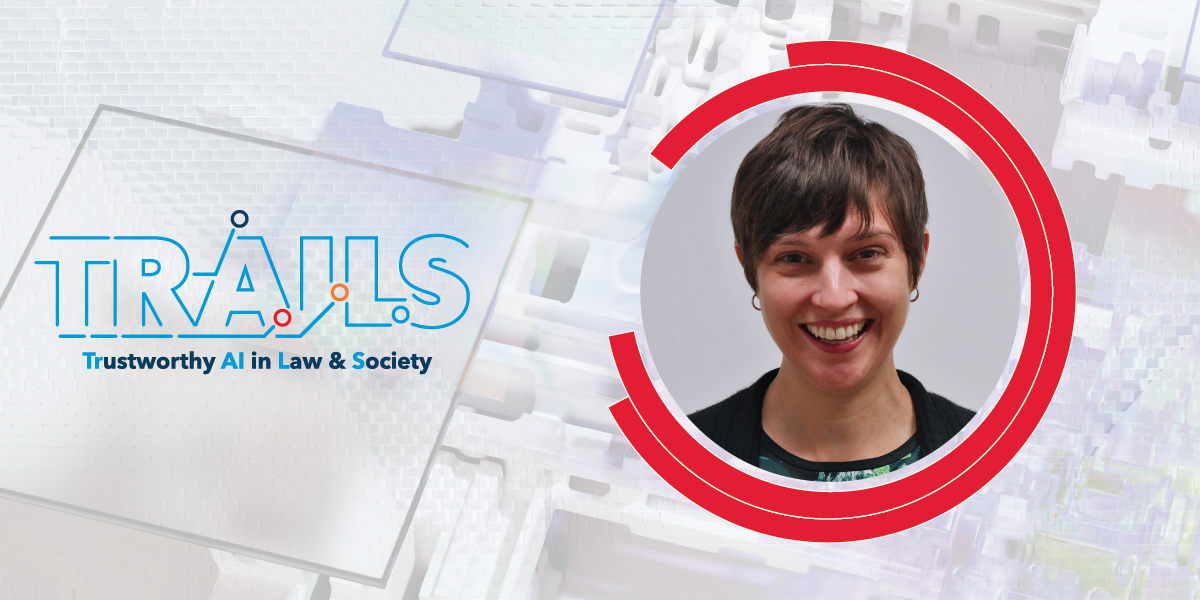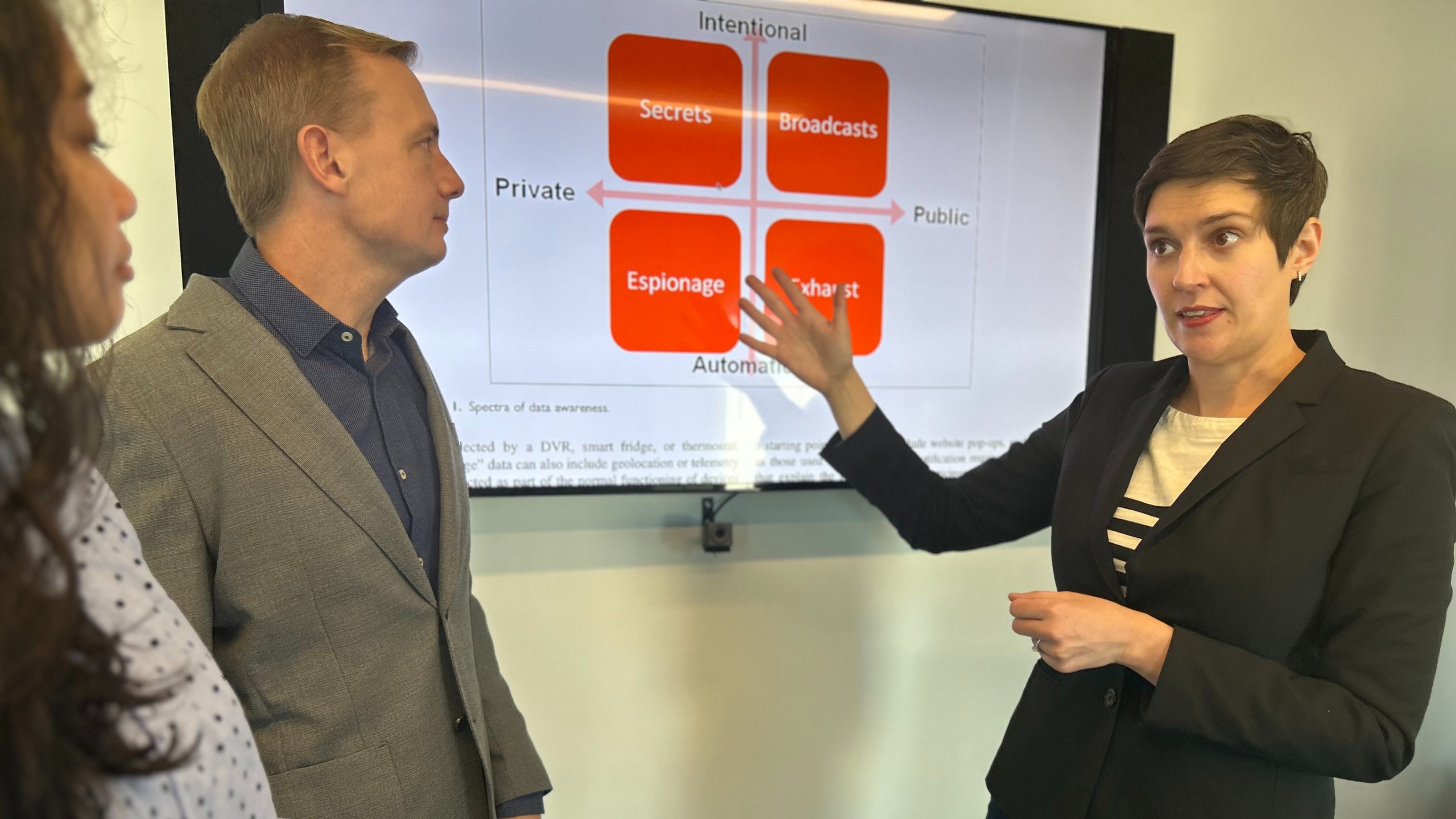The institute will take a holistic approach, integrating broader participation in AI design, new technology development, and more informed governance of AI-infused systems. The College of Information Studies team will include Katie Shilton, Cody Buntain, Hernisa Kacorri, Giovanni Luca Ciampaglia, and Naeemul Hassan.

Photo of Dr. Katie Shilton
The University of Maryland has been chosen to lead a multi-institutional effort supported by the National Science Foundation (NSF) that will develop new artificial intelligence (AI) technologies designed to promote trust and mitigate risks, while simultaneously empowering and educating the public.

(From left) University of Maryland doctoral student Lovely-Frances Domingo, Professor Hal Daumé III and Associate Professor Katie Shilton discuss some of Shilton’s work on ethics and policy for the design of information technologies. Daumé and Shilton are helping lead the new $20M NSF Institute for Trustworthy AI in Law & Society. Credit: Maria Herd
The NSF Institute for Trustworthy AI in Law & Society (TRAILS) announced on May 4, 2023, unites specialists in AI and machine learning with social scientists, legal scholars, educators and public policy experts. The multidisciplinary team will work with impacted communities, private industry and the federal government to determine what trust in AI looks like, how to develop technical solutions for AI that can be trusted, and which policy models best create and sustain trust.
Funded by a $20 million award from NSF, the new institute is expected to transform the practice of AI from one driven primarily by technological innovation to one that is driven by ethics, human rights, and input and feedback from communities whose voices have previously been marginalized.
“As artificial intelligence continues to grow exponentially, we must embrace its potential for helping to solve the grand challenges of our time, as well as ensure that it is used both ethically and responsibly,” said UMD President Darryll J. Pines. “With strong federal support, this new institute will lead in defining the science and innovation needed to harness the power of AI for the benefit of the public good and all humankind.”
In addition to UMD, TRAILS will include faculty members from George Washington University (GW) and Morgan State University, with more support coming from Cornell University, the National Institute of Standards and Technology (NIST), and private sector organizations like the DataedX Group, Arthur AI, Checkstep, FinRegLab and Techstars.
At the heart of establishing the new institute is the consensus that AI is currently at a crossroads. AI-infused systems have great potential to enhance human capacity, increase productivity, catalyze innovation, and mitigate complex problems, but today’s systems are developed and deployed in a process that is opaque and insular to the public, and therefore, often untrustworthy to those affected by the technology.
“We’ve structured our research goals to educate, learn from, recruit, retain and support communities whose voices are often not recognized in mainstream AI development,” said Hal Daumé III, a UMD professor of computer science who is lead principal investigator of the NSF award and will serve as the director of TRAILS.
Inappropriate trust in AI can result in many negative outcomes, Daumé said. People often “overtrust” AI systems to do things they’re fundamentally incapable of. This can lead to people or organizations giving up their own power to systems that are not acting in their best interest. At the same time, people can also “undertrust” AI systems, leading them to avoid using systems that could ultimately help them.
Given these conditions—and the fact that AI is increasingly being deployed to mediate society’s online communications, determine health care options, and offer guidelines in the criminal justice system—it has become urgent to ensure that people’s trust in AI systems matches those same systems’ level of trustworthiness.
TRAILS has identified four key research thrusts to promote the development of AI systems that can earn the public’s trust through broader participation in the AI ecosystem.
The first, known as participatory AI, advocates involving human stakeholders in the development, deployment and use of these systems. It aims to create technology in a way that aligns with the values and interests of diverse groups of people, rather than being controlled by a few experts or solely driven by profit.
Leading the efforts in participatory AI is Katie Shilton, an associate professor in UMD’s College of Information Studies who specializes in ethics and sociotechnical systems. Tom Goldstein, a UMD associate professor of computer science, will lead the institute’s second research thrust, developing advanced machine learning algorithms that reflect the values and interests of the relevant stakeholders.
Daumé, Shilton and Goldstein all have appointments in the University of Maryland Institute for Advanced Computer Studies, which is providing administrative and technical support for TRAILS.
David Broniatowski, an associate professor of engineering management and systems engineering at GW, will lead the institute’s third research thrust of evaluating how people make sense of the AI systems that are developed, and the degree to which their levels of reliability, fairness, transparency and accountability will lead to appropriate levels of trust. Susan Ariel Aaronson, a research professor of international affairs at GW, will use her expertise in data-driven change and international data governance to lead the institute’s fourth thrust of participatory governance and trust.
Virginia Byrne, an assistant professor of higher education and student affairs at Morgan State, will lead community-driven projects related to the interplay between AI and education. According to Daumé, the TRAILS team will rely heavily on Morgan State’s leadership—as Maryland’s preeminent public urban research university—in conducting rigorous, participatory community-based research with broad societal impacts.
Additional academic support will come from Valerie Reyna, a professor of human development at Cornell, who will use her expertise in human judgment and cognition to advance efforts focused on how people interpret their use of AI.
Federal officials at NIST will collaborate with TRAILS in the development of meaningful measures, benchmarks, test beds and certification methods—particularly as they apply to important topics essential to trust and trustworthiness such as safety, fairness, privacy, transparency, explainability, accountability, accuracy and reliability.
“The ability to measure AI system trustworthiness and its impacts on individuals, communities and society is limited. TRAILS can help advance our understanding of the foundations of trustworthy AI, ethical and societal considerations of AI, and how to build systems that are trusted by the people who use and are affected by them,” said Under Secretary of Commerce for Standards and Technology and NIST Director Laurie E. Locascio.
Today’s announcement is the latest in a series of federal grants establishing a cohort of National Artificial Intelligence Research Institutes. This recent investment in seven new AI institutes, totaling $140 million, follows two previous rounds of awards.
“Maryland is at the forefront of our nation’s scientific innovation thanks to our talented workforce, top-tier universities, and federal partners,” said U.S. Sen. Chris Van Hollen (D-Md.). “This National Science Foundation award for the University of Maryland—in coordination with other Maryland-based research institutions including Morgan State University and NIST—will promote ethical and responsible AI development, with the goal of helping us harness the benefits of this powerful emerging technology while limiting the potential risks it poses. This investment entrusts Maryland with a critical priority for our shared future, recognizing the unparalleled ingenuity and world-class reputation of our institutions.”
The NSF, in collaboration with government agencies and private sector leaders, has now invested close to half a billion dollars in the AI institutes ecosystem—an investment that expands a collaborative AI research network into almost every U.S. state.
“The National AI Research Institutes are a critical component of our nation’s AI innovation, infrastructure, technology, education and partnerships ecosystem,” said NSF Director Sethuraman Panchanathan. “[They] are driving discoveries that will ensure our country is at the forefront of the global AI revolution.”
###
This research is supported by the National Science Foundation (Award IIS-2229885). This story does not necessarily reflect the views of this organization.
About the National Science Foundation
The U.S. National Science Foundation is an independent federal agency that supports science and engineering in all 50 states and U.S. territories. NSF was established in 1950 by Congress to promote the progress of science; advance the national health, prosperity and welfare; and secure the national defense. The organization fulfills its mission chiefly by making grants. NSF investments account for about 25% of federal support to America’s colleges and universities for basic research: research driven by curiosity and discovery. NSF also supports solutions-oriented research with the potential to produce advancements for the American people.
About the University of Maryland
The University of Maryland is the state’s flagship university and a leading public research institution, propelled by a $1.3 billion joint research enterprise. Located four miles from Washington, D.C., the university is dedicated to addressing the grand challenges of our time. It is driven by a diverse and proudly inclusive community of more than 50,000 fearless Terrapins. UMD is a top producer of Fulbright scholars and offers an unparalleled student experience with more than 300 academic programs, 25 living-learning programs and 400 study abroad programs. Spurred by a culture of innovation and creativity, UMD faculty are global leaders in their field and include Nobel laureates, Pulitzer Prize winners and members of the national academies.